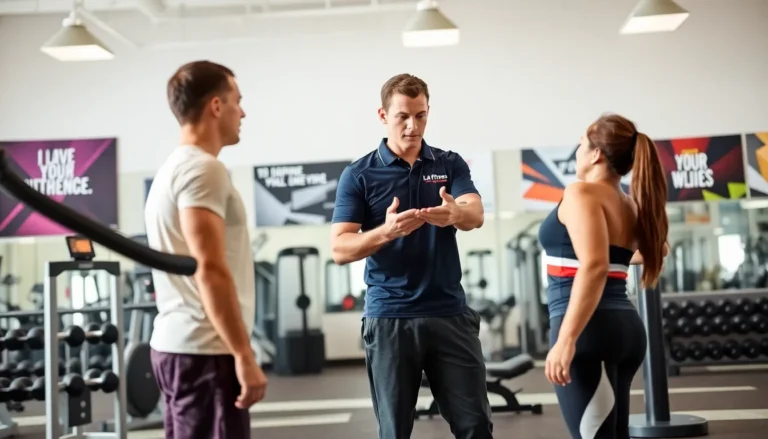In a world where fitness fads come and go faster than a treadmill on high speed, finding reliable fitness advice can feel like searching for a needle in a haystack. But fear not! Whether you’re a gym newbie or a seasoned pro, there’s a treasure trove of tips waiting to be uncovered.
Table of Contents
ToggleImportance Of Fitness Advice
Understanding fitness advice plays a crucial role in achieving health goals. Quality guidance helps individuals tailor workout routines to their specific needs. Reliable fitness tips can enhance motivation, leading to consistency in exercise regimens.
Trustworthy advice prevents misinformation that often circulates through social media and popular culture. Educated choices about exercises and nutrition foster both physical and mental well-being. Expert recommendations guide individuals in avoiding injury and optimizing performance.
Prioritizing fitness guidance from reputable sources, like certified trainers or registered dietitians, increases the likelihood of success. Diverse approaches to fitness can cater to various preferences, ensuring that everyone finds an activity they enjoy. Structured fitness plans promote progress tracking, allowing individuals to see tangible results over time.
Regular access to sound fitness advice keeps individuals informed about new research and emerging trends. Engaging with communities focused on shared fitness goals can provide support and accountability. Attending workshops or online seminars can also enhance one’s knowledge, creating opportunities for personal growth.
Incorporating fitness advice benefits overall health, improving cardiovascular endurance, strength, and flexibility. Realizing the value of expert opinions leads to more sustainable and effective fitness practices. Investing in well-researched fitness tips ultimately empowers individuals on their health journeys, ensuring they make informed decisions that align with their aspirations.
Key Components Of Fitness Advice

Effective fitness advice focuses on nutrition and exercise. These elements support one’s overall health and well-being.
Nutrition Tips
Balanced meals enhance energy levels and aid recovery. Incorporating whole foods, such as fruits, vegetables, lean proteins, and whole grains, fuels the body efficiently. Staying hydrated plays a crucial role too; water regulates temperature and improves performance. Portion control helps manage calorie intake while ensuring nutrient quality. Consuming a variety of foods enriches the diet with essential vitamins and minerals. Seeking guidance from registered dietitians provides personalized meal plans that cater to individual health goals.
Exercise Guidelines
Establishing a consistent workout routine boosts physical and mental health. Engaging in strength training enhances muscle mass and bone density, while cardio workouts improve cardiovascular health. Aiming for at least 150 minutes of moderate aerobic activity per week aligns with health recommendations. Flexibility exercises, like yoga or stretching, promote better range of motion and injury prevention. Rest days are vital; they allow muscles to recover and adapt. Consulting fitness professionals ensures tailored programs that align with personal fitness levels and objectives.
Common Mistakes In Fitness Advice
Navigating fitness advice often involves common pitfalls that hinder progress. Understanding these mistakes helps individuals make more informed decisions.
Ignoring Individual Needs
Ignoring individual needs leads to ineffective workout routines. Fitness goals vary significantly among individuals. One approach doesn’t suit everyone, as factors such as age, body type, and personal preferences matter. Personalized plans consider these differences, enhancing motivation and adherence. Trainers who focus on unique client profiles often produce better results. Also, neglecting to assess one’s fitness level can cause injuries or burnout. It’s crucial for individuals to seek tailored advice from professionals who recognize their distinct requirements.
Overemphasizing Quick Results
Overemphasizing quick results often leads to disappointment. Many fitness trends promote rapid transformations, creating unrealistic expectations. Individuals seeking instant success may resort to unhealthy methods. Instead, sustainable progress usually requires time and consistent effort. Long-term fitness journeys are built on patience, discipline, and gradual improvements. Emphasizing the process rather than rushed outcomes fosters healthier habits and reduces the risk of injury. Recognizing that fitness is a lifelong commitment encourages realistic goals for lasting results.
Sources Of Reliable Fitness Advice
Trustworthy information is crucial for effective fitness strategies. Certified fitness professionals serve as a primary source for sound advice. Credentials from organizations such as the American Council on Exercise (ACE) or the National Academy of Sports Medicine (NASM) indicate a qualified background. Registered dietitians also provide valuable nutritional guidance, helping individuals create balanced meal plans based on specific goals.
Peer-reviewed journals and articles offer insights based on current research. Professionals regularly publish in these journals, contributing to the body of knowledge in fitness and nutrition. Accessing studies from platforms like PubMed provides evidence-based information, ensuring recommendations align with the latest findings.
Fitness-oriented websites created by industry experts can be beneficial. Many of these sites feature articles, workout plans, and nutrition tips backed by scientific understanding. It’s important to cross-reference these resources with multiple authoritative outlets to confirm their reliability.
Social media platforms can offer both useful and misleading content. Following reputable trainers or nutritionists who share evidence-based advice helps users avoid misinformation. Engaging in discussions within fitness communities can also provide new perspectives and support.
Podcasts featuring fitness professionals frequently share practical insights and expert interviews. These discussions can cover diverse fitness topics, making them a rich source of information.
Networking with local fitness groups or attending workshops enhances access to reliable fitness advice. Connecting with individuals who prioritize credible information creates a supportive environment conducive to learning and growth.
Navigating the world of fitness advice can be overwhelming but making informed choices is essential. By prioritizing guidance from credible sources and tailoring fitness plans to individual needs, anyone can embark on a successful health journey. Emphasizing sustainable progress over quick fixes fosters long-term commitment and well-being.
Engaging with fitness communities and utilizing professional resources can enhance motivation and support. As individuals continue to seek out trustworthy information, they’ll not only improve their fitness levels but also cultivate a healthier lifestyle. Staying informed and connected is key to achieving lasting results in fitness and overall health.




